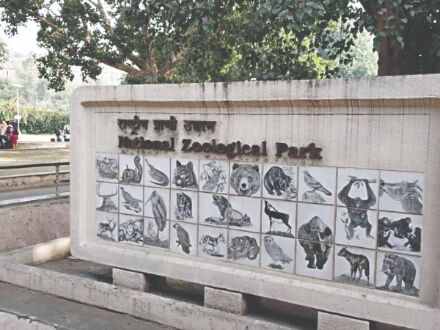Delhi zoo gets Bengal tigress for breeding, loses tiger the next day

New delhi: Just when the Delhi zoo was celebrating the arrival of a Royal Bengal tigress, the first in six years, from the Kanpur zoo for conservation breeding under an animal exchange programme, its 15-year-old Bengal tiger Bittu died on Thursday due to a kidney-related ailment.
The tiger, 'B-2', affectionately called Bittu, was brought from Bhopal's Van Vihar Zoo in 2014. He was not keeping well for many months and displayed acute symptoms of "chronic kidney disorder", zoo director Ramesh Pandey said. The tiger breathed his last at 9.25 am,
he said.
A Bengal tiger has an average lifespan of 8 to 10 years in the wild. The maximum lifespan of the animal is about 15 years.
"The best possible treatment and personal care was given to the animal in consultation with experts from Indian Veterinary Research Institute (IVRI), Bareilly. B-2 was under intensive care for more than 20 days," Pandey said.
The post-mortem of the feline will be conducted by a panel of veterinary doctors and the viscera sent to IVRI for histo-pathological and other examinations to ascertain the causes of death, the zoo director said. The Delhi zoo had three Royal Bengal tigers till a year ago.
One of the three, eight-year-old Rama, died at the zoo in September last year due to kidney failure. He was brought from the Mysore zoo in 2014. Bittu's death dampened the celebrations on the arrival of Barkha, a six-year-old Royal Bengal tigress, who was brought from the Kanpur zoo on Wednesday for breeding proposes under an animal exchange programme, officials said.
Barkha will form a pair with Karan, who is also aged around six.
The Delhi zoo did not have a Royal Bengal tigress for six years despite it being a participating zoo for the Conservation Breeding Programme of Bengal Tiger,
Pandey said.
According to the Central Zoo Authority, the Conservation Breeding Programme is the science of conserving a species by preventing imminent population collapse in the wild due to a large number of eliminative pressures (such as habitat loss, habitat fragmentation, industrialization, poaching, illegal trade and climate change).
Recently, the Delhi zoo acquired five species — wild boar, black and grey partridge, golden pheasant, Eurasian dove and jungle cat — from Chandigarh's Chhatbir Zoo.
A male rhino from Patna will be brought soon for breeding purposes. There are two female rhinos in the Delhi zoo at present, Pandey said. It is also likely to acquire chinkara and a pair of ostrich from Chandigarh and pair of striped hyena from Jaipur. The last chinkara of the zoo had died in June last year.
"There are around 88 species in the Delhi zoo at present. We hope to increase this number to 100 by the end of this year," Pandey said.



